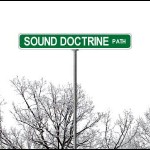Ministry is not something special we do; it is something we live.
Katie at “Backseat Driver” has written another good post called “Questions Continued: What About Financial Support?” The post is a continuation of a series that she is writing about questions raised concerning organic / simple / missional church.
Now, don’t let the topic or the labels concern you. This post, and many of the others that she’s written, can help us think about who we are in Christ regardless of how we organize ourselves as the church. In fact, some of these topics may even help us modify how we organize or don’t organize.
While this particular post is about “financial support,” the basis of the post is what it means to minister to or serve others.
At one point, Katie writes:
When we work at a job/jobs, it means that there is not a lot of extra time to “do” ministry in the way we have thought it had to happen in the past traditional sense. This is where we think of ministry only happening in time slotted meetings, prepared orations of teaching, directed study, preplanned activities and organized events. The Simple, Organic, Missional paradigm is that ministry is not something we do, but rather live, and it fits into our lives naturally in its’ various contexts. It is not something for the “chosen few” professionals, but rather the whole Body of Christ. It is not “slotted” but fluid, and responsive to the direction of the Holy Spirit. We look for opportunities at work, with our families, in our neighborhood, with people we associate with through our children, communities of activity, in fellowship with other Christians, etc. to live ministry and Christ fluidly and naturally in all contexts. I spoke with a guy recently who resigned from a pastoral job and went back to school to become a nurse. He shared with me that he feels he is ministering to others far more through his nursing job, than he did through his weekly church events that were called “ministry”.
What Katie describes is exactly how Scripture uses the term that we translate as “ministry.” It’s the same term that is often translated as “service.” If you are serving someone, then you are ministering to that person. It really is that simple.
Ministry is not about a job, or a position, or a set time, or a special event, or an affiliation, or an education, or a title… it’s about serving others in Jesus’ name… whenever and wherever.
Replay: Follow the Leader or Simon Says?
Five years ago, I wrote a post called “Follow the leader or Simon says?” In the post, I compared the two children’s games “Follow the leader” and “Simon says.” Believe it or not, both children’s games have leaders, but the leader in one game functions quite differently than the leader in the other game. I one of these games is a good example of how “leaders” should function among the church, while the other game is a good example of how “leaders” often function today among the church… unfortunately.
——————————-
Follow the leader or Simon says?
I’m working on a series about the role and function of elders among a community of believers. I’ve discussed leadership on this blog before, and those posts usually generate great discussions both online and off-line. I hope to begin publishing that series next week, but I may have to push it back another week. As I study, the series keeps expanding.
As I was thinking about the relationship between elders and leading, I thought about two children’s games: “Follow the leader” and “Simon says”.
In the game “Follow the leader”, children follow the actions of a “leader”. If the “leader” walks, then the others walk. If the “leader” runs, the the others run. The “leader” is doing everything as an example for others to “follow”. But, the important point here is that the “leader” is doing – he or she is active. The other children in line follow the example of the “leader’s” actions.
In the game “Simon says”, children follow the directions of a “leader”. If the “leader” says, “Walk”, then the others walk. If the “leader” says, “Run”, then the others run. The “leader” is not active. Instead, the “leader” tells the others what to do. The other children do not follow the example of the “leader’s” actions. Instead, the other children are supposed to follow the commands of the “leader”.
I think many churches are built around “Simon says” type leadership, while Jesus points to “Follow the leader” type leadership. In fact, there is only one “Simon” for the follower of Jesus Christ. And, while Jesus alone possesses the authority to command, he chose to come as a “Follow the leader” type leader.
We need more examples to follow, and less Simons to obey.
Guest Blogger: Being the Church to the Community Around Us
I’ve invited people to write “guest blog posts” for this blog. There are several reasons for this: 1) To offer different perspectives. 2) To generate even more discussion and conversation between blogs. 3) To introduce other bloggers to my readers.
(If you are interested in writing a guest blog post, please contact me at aknox[at]sebts[dot]com.)
Today’s post was written by Allen Madding. You can connect with Allen via his blog or Twitter (@allenmadding). Also, check out Feed the Hungry Forsyth at their website, Twitter (@feedforsyth), or Facebook.
——————————————-
Being the Church to the Community Around Us
For years the Church has gotten a bad rap for building a grandiose cathedral and expecting the lost and hurting to come to them. When the lost and hurting does not respond, committees are formed to try to figure out why. And when the Church contemplated service, they looked overseas – raised money, bought plane tickets and travelled thousands of miles away completely overlooking the hurting in the community that surrounded them. So the hurting in the community became skeptical of the Church and its motives. And who could blame them? If you were hungry and the Church walked by you every day and pretended not to notice you, would you trust them? If you were homeless and the Church turned a blind eye to you, would you trust them? How receptive would you be to someone explaining the gift of salvation to you if you had not had a meal in weeks and did not have a dry place to sleep? How could you accept the message that God is love and God loves you when you felt like his people did not care about you?
Although we live in one of the wealthiest countries in the world, 13 percent of those living in the United States live in poverty. One in four or 16.7 million children in the United States live in a household that does not know where the next meal is coming from – a situation we refer to as food insecurity. More than 49 million Americans, roughly 14.6 percent of the U.S., regularly face food insecurity.
What is the Church’s role in this situation? I believe we are called to open our hands and turn loose of the blessings we hold so tight. Instead of spending every dollar we make on a bigger house, fancier kitchens, a nicer foreign car, and a bigger flat screen, maybe we should pair down our lifestyles and bless the hurting.
What does the Bible say?
“The generous will themselves be blessed,
for they share their food with the poor.” Proverbs 22:9
John answered, “Anyone who has two shirts should share with the one who has none, and anyone who has food should do the same.” Luke 3:11
“From everyone who has been given much, much will be demanded; and from the one who has been entrusted with much, much more will be asked.” Luke 12:48
Mother Teresa put it like this, “When a poor person dies of hunger, it has not happened because God did not take care of him or her. It has happened because neither you nor I wanted to give that person what he or she needed.”
So how do we respond? First we have to open our eyes to the needs in the community around us. Once we recognize the need, we need to ask how we can make a long-term response. Handing a hungry man a sandwich is good. But in six hours, he will be hungry again. Providing a hungry family a week’s worth of groceries once a week is a better answer. Finally, the Church does not have to create another program or ministry. It would be far better to seek out the nonprofits in the community that are struggling to respond to the need and provide them with financial support and an army of volunteers.
Responding to the needs in the community is not optional. The Church is called to respond. Jesus said, “Whatever you did for one of the least of these brothers and sisters of mine, you did for me.” (Matthew 25:40)
Make a Difference!
Replay: Doctrine is not doctrine anymore
Four years ago, I wrote a post called “Doctrine is not doctrine anymore.” The point of the post is to consider how “doctrine” is usually viewed today as concepts or knowledge. But, to the authors of the New Testament, “doctrine” or “instruction” or “teaching” (all translations of the same word) goes much, much beyond concepts or knowledge and instead encompasses a way of life. Think about how much different our teaching would be if we were as concerned with a way of life instead of only facts.
—————————————
Doctrine is not doctrine anymore
In Acts 2:42, Luke begins to describe the response of those first Christians after receiving the promised Holy Spirit:
And they devoted themselves to the apostles’ teaching and fellowship, to the breaking of bread and the prayers. (Acts 2:42 ESV)
What does it mean that these early followers of Jesus “devoted themselves to the apostles’ teaching”? As long as I can remember, I’ve been taught that this means that they listened to sermons by the apostles, or at least by those who had heard sermons by the apostles. So, they “devoted themselves” or they “continued in” or they “persevered in” listening to someone teach them.
This sounds good. We all know that “teaching” or “doctrine” is a set of biblical fact, so it makes sense that those early believers would spend time listening to what the apostles had to say. They studied “doctrine” so that they would know what they needed to know.
But, there’s a problem with this picture. “Teaching” or “doctrine” or “instruction” (they are translations of the same word – no difference) in Scripture does not point to something that is simply known. Instead, “teaching” points to something that is demonstrated in both word and deed. Words alone would not be considered a “teaching”; but words combined with a living example would be considered a “teaching”.
Don’t misunderstand me… When I say “words combined with a living example”, I’m not talking about a sermon with application points. “Applications points” are still words. Instead, I’m saying that someone who brings a “teaching” or “doctrine” only does so when the life of the “teacher” matches the words and is demonstrated before the ones who are learning. In other words, a “teaching” combines both words and a way of living that is witnessed and imitated by those who are learning.
Consider Paul’s words to the church in Phillipi:
What you have learned and received and heard and seen in me – practice these things, and the God of peace will be with you. (Philippians 4:9 ESV)
Consider his reminder to the Thessalonians:
For we never came with words of flattery, as you know, nor with a pretext for greed – God is witness. Nor did we seek glory from people, whether from you or from others, though we could have made demands as apostles of Christ. But we were gentle among you, like a nursing mother taking care of her own children. So, being affectionately desirous of you, we were ready to share with you not only the gospel of God but also our own selves, because you had become very dear to us. For you remember, brothers, our labor and toil: we worked night and day, that we might not be a burden to any of you, while we proclaimed to you the gospel of God. You are witnesses, and God also, how holy and righteous and blameless was our conduct toward you believers. (1 Thessalonians 2:5-10 ESV)
Finally, in his letter to Titus, Paul specifically connects “doctrine” and “teaching” to more than words, as he parallels “teach what accords with sound doctrine” with “show yourself”:
But as for you, teach what accords with sound doctrine. Older men are to be sober-minded, dignified, self-controlled, sound in faith, in love, and in steadfastness. Older women likewise are to be reverent in behavior, not slanderers or slaves to much wine. They are to teach what is good, and so train the young women to love their husbands and children, to be self-controlled, pure, working at home, kind, and submissive to their own husbands, that the word of God may not be reviled. Likewise, urge the younger men to be self-controlled. Show yourself in all respects to be a model of good works, and in your teaching show integrity, dignity, and sound speech that cannot be condemned, so that an opponent may be put to shame, having nothing evil to say about us. Slaves are to be submissive to their own masters in everything; they are to be well-pleasing, not argumentative, not pilfering, but showing all good faith, so that in everything they may adorn the doctrine of God our Savior. (Titus 2:1-10 ESV)
Titus was to teach with his words, but just as importantly, he was to teach with his life. For Paul, teaching with words could not be separated from teaching with lifestyle. Of course, this means that Titus would have to live his life among those he was teaching. It was not enough to simply see them occasionally. In order to Titus to teach “sound doctrine” he would have to live “sound doctrine” with the people.
So, those early believers that Luke described in Acts 2 were devoting themselves to the words and lifestyle of the apostles. They heard what the apostles said, and they saw how the apostles lived. In response to this and to the Spirit’s work in their lives, they spoke and lived in the same way. They did not simply listen to sermons about what to belief. They heard, watched, and lived with the apostles and other believers, and learned from their “living doctrine”.
What does this mean for us? It means that when we make a list of “beliefs” and call it “doctrine”, we are not using the word “doctrine” in a scriptural sense. It means that when we stand before a group of strangers and give them good, biblical information, we are not bringing a “teaching” in the way that the word is used in Scripture.
Primarily, for those of us who desire to make disciples of Jesus Christ, it means that our lives must demonstrate what our mouth is saying. We must live among and with people who are learning from us. Teaching cannot be done at a distance to an audience of strangers. Teaching (in the scriptural sense) occurs when people share their lives together, not when the teacher stands behind a podium.
When it comes to giving to others, why do we usually seem to start with reasons to not give?
I don’t know about you, but I’ve enjoyed following Chuck on his newish blog “Being Filled” (and, of course, I’ve enjoyed his interactive here and on Twitter). One of his latest posts is called “Give to Everyone Who Asks of You.”
Whenever I hear someone teach about this subject (or read someone who has written about this subject) they almost always begin with exceptions for giving or justifications for not giving. Interestingly, Chuck deals with many of these excuses in his own post.
For example, concerning the excuse “he doesn’t deserve it,” Chuck writes:
You’re right; he doesn’t deserve it. You don’t deserve it either. What you have is not the result of your own careful planning and managing. Everything you have is a gift of God. And God has just commanded you to pass some of that gift on to another undeserving person.
Chuck covers several other excuses as well.
But, I’m not concerned so much with the excuses and whether or not they are justified. But, when I read Chuck’s post, and went back and read Jesus’ command in context, I noticed something:
In every instance in Scripture where it is recorded that Jesus commanded “Give to everyone who asks of you,” he said that in the context of loving our enemies. Think about that… Jesus is talking about giving to people who oppose us… and giving them anything they ask from us. (There are other commands and examples of giving to people who are not our enemies, but this context was about giving to enemies.)
Again, I’m not interested in when, where, why, and how we may or may not be justified to not give, I’m simply pointing out that when Jesus commanded us to give, he was not talking about giving to people who agree with us or even to people who like us.
This is certainly a different kind of giving… If Jesus began in the context of enemies, why do we typically begin with reasons not to give?
Replay: I desire mercy, and not sacrifice
Four years ago, we were studying the Gospel of Matthew together on Sunday mornings when we gathered with the church. During that time and in response to part of that study and discussion, I wrote a post called “Mercy not Sacrifice.” The title of that post (and this replay, of course) comes from Matthew 9 (and Hosea 6). God commanded his people to offer sacrifices, but both the prophet Hosea and Jesus said that God did not want their sacrifices. huh? God desires mercy and not the sacrifices? Yes. God desires for us to show love to others more than doing everything just right? Yes.
———————————–
Mercy not Sacrifice
Next Sunday, we’ll be studying Matthew 9:9-13. I’m not scheduled to teach, but I’m continuing to study along in case God teaches me something that would transform my own life and perhaps that he would want me to share with others in order to build them up toward maturity in Christ. Here is the passage:
As Jesus passed on from there, he saw a man called Matthew sitting at the tax booth, and he said to him, “Follow me.” And he rose and followed him. And as Jesus reclined at table in the house, behold, many tax collectors and sinners came and were reclining with Jesus and his disciples. And when the Pharisees saw this, they said to his disciples, “Why does your teacher eat with tax collectors and sinners?” But when he heard it, he said, “Those who are well have no need of a physician, but those who are sick. Go and learn what this means, ‘I desire mercy, and not sacrifice.’ For I came not to call the righteous, but sinners.” (Matthew 9:9-13 ESV)
The quotation, “I desire mercy, and not sacrifice”, is from Hosea 6:
What shall I do with you, O Ephraim? What shall I do with you, O Judah? Your love is like a morning cloud, like the dew that goes early away. Therefore I have hewn them by the prophets; I have slain them by the words of my mouth, and my judgment goes forth as the light. For I desire steadfast love [mercy] and not sacrifice, the knowledge of God rather than burnt offerings. But like Adam they transgressed the covenant; there they dealt faithlessly with me. (Hosea 6:4-7 ESV)
For the children of Israel during Hosea’s time and for the Pharisees of Jesus’ time, following God meant offering sacrifices and attending religious festivals as well as living according to the law. But for all their sacrifices and attendance and law keeping, Jesus (and God through the prophet Hosea) says that they were actually “transgressing the covenant”. They had forgotten about mercy.
In Matthew 9:9-13, Jesus is eating with Matthew and some of his tax collecting friends. The Pharisees were appalled that Jesus would eat with that kind of low life scum. Everyone knew that tax collectors were cheaters and traitors – sinners. That is why the Pharisees would have nothing to do with them.
Jesus knew the deplorable nature of the tax collectors also. That is why Jesus spent time with them. Thus, Jesus turns the world upside down. The righteous one spends his time with the unrighteous, because it is more important for God’s people to offer mercy to others than to offer sacrifices to God (without mercy). The sacrifices and offerings and feasts and rituals meant nothing to God if the people were not also dealing mercifully with others.
The religious leaders of Jesus’ day were always getting mad at Jesus for hanging out with people like tax collectors and prostitutes and drunkards and lepers and others of an unsavory sort. He spent so much time with them, that the religious leaders started saying the Jesus was a glutton and a drunkard. But, Jesus knew that these were the people who most needed the love and mercy of God. These were the people who needed a true demonstration of God’s grace.
Today, there are many, many people who need a true demonstrate of God’s grace. They need to know the love and mercy of God. And, God’s children are the only ones who can demonstrate God’s grace, mercy, and love to them.
God desires for us to demonstrate his mercy more than we care about our religious gatherings and exercises. Which do we care more about?
Back home – resting and catching up
We arrived back home yesterday afternoon (Saturday, June 23, 2012) after a week of working with many teenagers and adults from around the southeast. We were all in Norfolk, VA to serve people in the name of Jesus Christ through various forms of construction and painting. We were not building houses. Instead, we were working on houses that were in bad shape and whose owners could not afford to maintain them.
During the last week, I primarily spent time with two different groups: the people who traveled with me from Youngsville, NC, and the work crew which was made up of people from five different cities in three different states. It was a special time with both groups.
One of the young men in my work crew described it like this on Facebook:
My crew was so encouraging and each and everyone of them was awesome! They were always happy and willing and wanting to work! … Our crew ate together, laughed together, cried together, worked together, bernied together, and loved together. I could not ask for a better crew. It showed that people from around the country that have never met before can work together to spread the Gospel.
I was also very encouraged by the adults and teenagers that I traveled with. I learned so much from them, especially one young lady in particular who stepped outside of her comfort zone in many ways including sharing the gospel with people in the neighbor of the house where she was working.
It was a long week of hard work during hot and humid weather. So, I’m tired, and resting.
I realize that I have many comments on the blog that need a response. I hope to get to them in the next couple of days. Please be patient with me.
Most Read Post of 2011: How Does the Church Respond to Poverty?
I’m out of town this week, so I’m linking to the most read posts on my blog from each year from 2007 to 2011.
The most read post on my blog from 2008 was “How Does the Church Respond to Poverty?”
Please take the time to read that post and the comments from my readers.
Thank you, and I’ll “see” you again soon.
Spending the week serving others with the church
My wife organized a week-long service project that we will be taking part in with some friends this week (Monday, June 18, 2012 – Friday, June 22, 2012). We’ll be traveling to a neighboring state to do construction work – primarily painting – for people who live in a low income neighborhood.
Our family will be taking part as well as several other families of believers that we meet with regularly. Also, some friends of friends will be joining us. On top of all that, believers from other churches from other areas will take part as well.
Most of the people who will be taking part in these projects will be teenagers. I’m looking forward to spending time serving people with some friends, and also I’m looking forward to getting to know some other brothers and sisters in Christ.
During this coming week, I will not be publishing new posts. Instead, I’m going to link to the most read post from each year of my blog from 2007 to 2011. Also, I will not be able to interact in the comments as much as normal.
I hope you enjoy these old posts as much as I’m sure I’ll enjoy spending time serving people in the name of our Lord.
Replay: Learning to live dependent on God and interdependent on one another
Four years ago, I wrote a post called “Interdependence.” The post was written after a weekend in which I witnessed a man who refused to admit that he needed help and refused to accept help when it was offered (although it was clear that he did need help). That same weekend, I witnessed a friend admit that she needed help and other friends offer help. It reminded me that we are both dependent on God, and interdependent upon one another – as God often works through his children to help one another.
I hope this post is as encouraging to you as the actual experiences were to me.
———————————–
Interdependence
As followers of Jesus Christ, we are both dependent upon God, and interdependent upon one another. Unfortunately, society teaches us to be independent – neither dependent nor interdependent. We’re taught to learn for ourselves, fend for ourselves, care for ourselves, earn for ourselves, and do for ourselves. We’re taught not to admit that we need help from anyone nor to accept help from anyone. This is the nature of American society, but it is not the nature of the follower of Jesus Christ – he or she has a new nature.
This point was driven home for me last Friday. Our family arrived at the event location for the North Raleigh / Wake Forest Relay for Life around 5:15 p.m. We were supposed to drop off our canopy, chairs, tables, etc. – which we did. The committee was supposed to pick up our stuff and take it to our site – which they did. I was supposed to park my vehicle – which I did – while my family walked to our site – which they did. Everything was going according to plan.
Except… as soon as I parked our van, it started to rain. It wasn’t a slow sprinkle, it was a gully-washer – at least, that’s what we called it in Alabama. The entire time that I was walking – running – to our event site, I could picture my family standing in the middle of a muddy field getting drenched by the rain. Imagine my surprise when I reached our site to find that two teenagers from a nearby site had come to their rescue! The two young men were helping my wife set up the canopy, and they had pulled all of our equipment under the canopy. Those two teenagers were my heroes that night! After I arrived, I helped them finish setting up the canopy, and we stayed as dry as we could while the rain continued.
Not long after our canopy was set up, another team arrived at the site next to ours. The team – at this time – consisted of a mother, her teenage daughter, and two or three more teenage girls. My family helped them spread their canopy over their stuff. We offered to help them raise their canopy, but they said they didn’t want to raise it yet. Instead, they stood under some umbrellas and waited for the husband to arrive.
When the husband arrived, I again went over and offered assistance. I told him that some boys from a neighboring site had helped us, and that we would love to help them set up their canopies – they actually had two. He said no. He didn’t need the help, but thank you anyway.
We watched and listened as he struggled to raise the canopy in the wind and rain. He was obviously getting frustrated because his family was not doing things the way he thought they should be done. They often spoke loudly – shouted – at one another as they tried to raise the two canopies and keep their stuff dry at the same time.
When the shouting had subsided for a moment, and when tempers seems to settle a little, I again walked over and asked if I could help. He said… and I quote… “No, we like to fight while we do this.” I told him that I would be glad to help, if he decided he needed anything. Then, I walked back to my canopy.
As I think back over this encounter, I recognize the church acting in this stubborn, independent manner many times. It seems that even believers have the attitude that they can do everything by themselves and they don’t need any one’s help. It often appears that many feel that asking for help or accepting help from others is a sign of weakness or spiritual immaturity.
This is such a travesty and a misunderstanding of what it means to be brothers and sisters in Christ. God provides us with relationships with one another so that we can love one another, accept one another, help one another, give to one another, and serve one another. We cannot make it through this life alone – at least, we cannot live the way God wants us to live alone. We need God, and we also need one another. Independence may be an American virtue, but it is a Christian vice.
The next day, Saturday, my family was helping one our young, single, female friends move. (I mentioned this briefly in my post called “Weekend of Service“.) A few weeks before, this young lady began telling people that she needed help finding a place to live. Another family asked if she would like to live with them. They shuffled their boys’ bedrooms so that our friend could have a room to herself, and Saturday afternoon, a bunch of us got together, packed up her belongings, and moved her into their house.
After unloading all of the boxes, another friend brought dinner for everyone. While I was sitting there enjoying a homemade meatball sub, I remembered the encounter with the man who refused to acknowledge that he needed help, and refused to accept help when it was offered. What a stark contrast to my friends, one of whom acknowledged that she needed help and accepted the help that was offered, and a family who was willing to put their own comforts aside and offer help.
This is a beautiful picture of God’s family. Brothers and sisters recognizing their complete dependence upon God and willing to live interdependent upon one another. That evening, I couldn’t help but thank them and praise God for the example of community that he had shown me that day.










